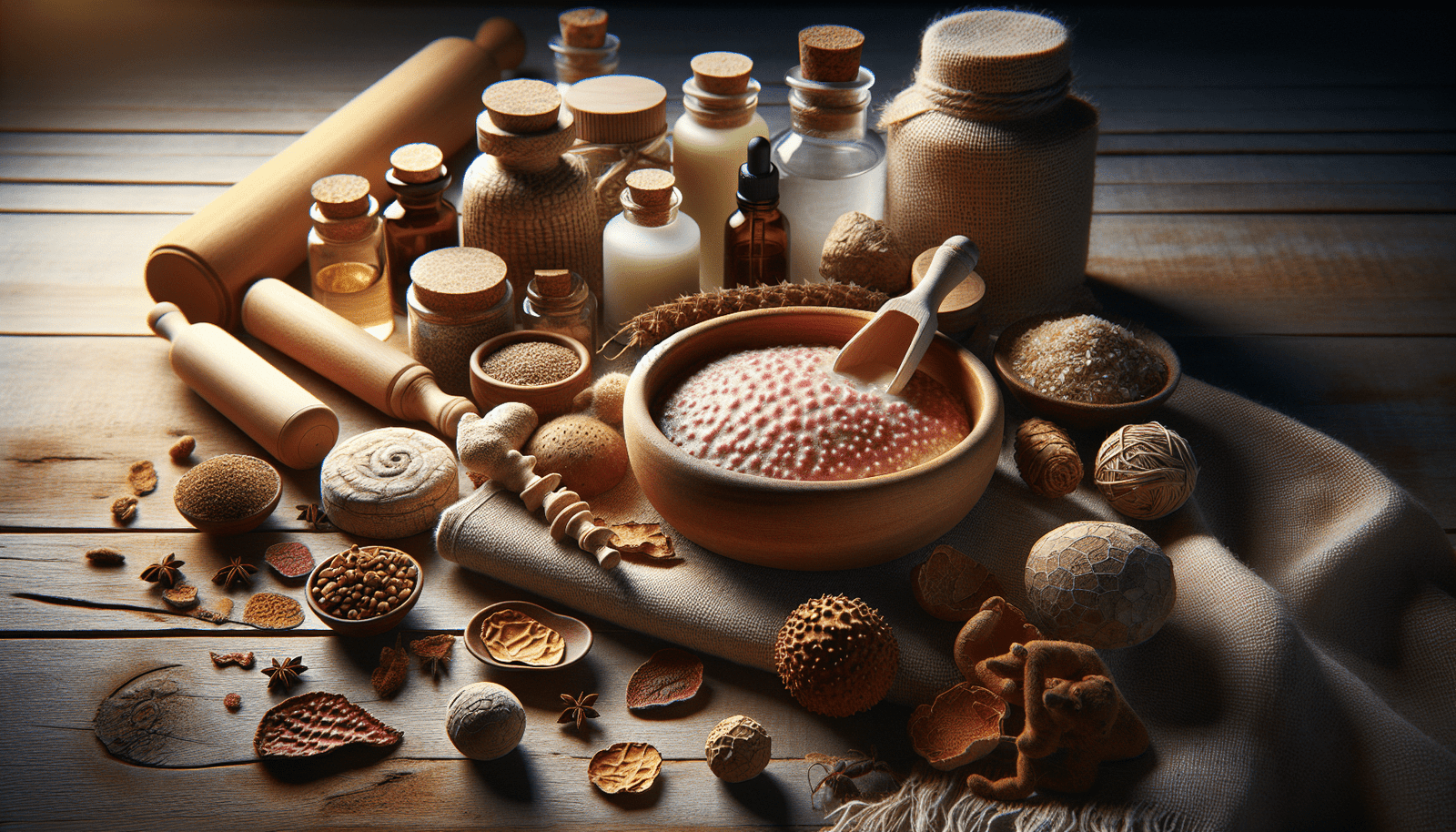If you or someone you know is struggling with the discomfort of eczema, you’ll be pleased to discover that there are a variety of natural remedies available to help provide relief. Eczema, a skin condition characterized by red, itchy, and inflamed patches, can be incredibly frustrating to deal with. However, by incorporating some simple changes into your daily routine, such as using natural oils, moisturizing regularly, and avoiding triggers, you can effectively manage and reduce the symptoms of eczema. In this article, we will explore these natural remedies in more detail, empowering you to find the best solution for your specific needs. So, let’s dive in and discover the secrets to finding relief from eczema within our natural surroundings!
Natural Remedies for Eczema Relief
If you suffer from eczema, you know how uncomfortable and frustrating it can be. The itchy, inflamed skin can make anyone feel miserable. While there are many treatments available, you may prefer to explore natural remedies to alleviate your symptoms. In this comprehensive guide, we will walk you through ten natural remedies for eczema relief, helping you identify triggers, maintain good hygiene, moisturize regularly, use natural oils, apply cold compresses, try soaking in oatmeal, explore herbal remedies, avoid irritants, manage stress, and consult a dermatologist when necessary.
1. Identify Triggers
To effectively manage your eczema, it is essential to identify triggers that may exacerbate your symptoms. Keeping a diary can be extremely helpful in pinpointing potential triggers. Documenting your daily activities, the food you eat, the products you use, and even the weather conditions can provide valuable insights. By reviewing your diary, you may notice patterns and identify triggers that you can avoid or minimize, such as certain foods, extreme temperatures, or chemical irritants.

2. Maintain Good Hygiene
Maintaining good hygiene is crucial when it comes to managing eczema. Here are a few hygiene practices you can incorporate into your routine to help alleviate your symptoms:
Bathe in Lukewarm Water
Instead of hot showers or baths, opt for lukewarm water. Hot water can strip away your skin’s natural oils, leading to further dryness and irritation. Lukewarm water will help soothe your skin without aggravating it.
Use Mild, Fragrance-Free Soap
Choose a gentle, fragrance-free soap specially formulated for sensitive skin. Harsh soaps with added fragrances can be irritating and worsen your eczema symptoms. Look for soap that is mild, hypoallergenic, and free of harsh chemicals.
Gently Pat Dry
After bathing, avoid rubbing your skin with a towel. Instead, gently pat your skin dry to retain moisture. Rubbing can cause friction and further irritate your sensitive skin, leading to more itching and inflammation.
Moisturize Immediately
Moisturizing your skin is essential to keep it hydrated and prevent dryness. After patting your skin dry, apply a thick, fragrance-free moisturizer all over your body. Pay extra attention to areas prone to dryness and itching, such as elbows and knees. Moisturizing immediately after bathing helps seal in the moisture from your lukewarm water and keeps your skin hydrated throughout the day.
3. Moisturize Regularly
Regular moisturizing is key to managing eczema. Here are some tips to effectively moisturize your skin:
Choose a Thick, Fragrance-Free Moisturizer
Look for a moisturizer that is thick in consistency and does not contain any added fragrances. Fragrances can be irritating to eczema-prone skin. A thick moisturizer will create a protective barrier, trapping moisture and preventing your skin from drying out.
Apply Moisturizer Multiple Times a Day
To maintain optimal hydration, apply your moisturizer multiple times a day. A good rule of thumb is to moisturize after every time you wash your hands or come into contact with water. This will help replenish the lost moisture and prevent your skin from becoming dry and itchy.
Pay Attention to Problem Areas
Every individual’s eczema may manifest differently. Pay attention to problem areas on your body and apply extra moisturizer on those areas. Whether it’s your elbows, behind your knees, or your face, giving extra attention to these areas can help soothe and moisturize the skin effectively.
Consider Moisturizers with Natural Ingredients
If you prefer natural remedies, consider moisturizers that contain natural ingredients like aloe vera or coconut oil. These ingredients have soothing properties that can help calm inflamed skin and provide relief from itching. Ensure to choose products that are specifically formulated for sensitive skin to reduce the risk of further irritation.

4. Use Natural Oils
In addition to moisturizers, natural oils can be beneficial for eczema-prone skin. Here are three types of natural oils you can explore:
Try Coconut Oil
Coconut oil has gained popularity for its various health benefits, including its potential to relieve eczema symptoms. Its natural moisturizing properties can help hydrate and soothe dry, itchy skin. Simply apply a thin layer of coconut oil to the affected areas and gently massage it in. However, it’s essential to note that coconut oil may not work for everyone, so monitor your skin’s reaction and discontinue use if it worsens your symptoms.
Consider Using Evening Primrose Oil
Evening primrose oil is derived from the seeds of the evening primrose plant. It contains gamma-linolenic acid (GLA), which has been shown to have anti-inflammatory properties. By applying a few drops of evening primrose oil to your skin, you may experience relief from redness and itching associated with eczema. As with any new product, it’s important to do a patch test to ensure you don’t have any adverse reactions.
Explore the Benefits of Tea Tree Oil
Tea tree oil is well-known for its antibacterial and anti-inflammatory properties. It may help reduce inflammation and soothe irritated skin. Mix a few drops of tea tree oil with a carrier oil, such as coconut oil or jojoba oil, and apply it to the affected areas. However, be cautious as tea tree oil can be potent and may cause irritation if used undiluted or if you have sensitive skin. Always dilute it and perform a patch test before applying it to larger areas of your body.
5. Apply Cold Compresses
Cold compresses can provide immediate relief from itching and inflammation associated with eczema. Here’s how you can effectively use them:
Wrap Ice Packs in a Towel
To protect your skin from direct contact with the ice pack, wrap it in a thin towel. This will prevent any potential damage to your skin from extreme cold.
Apply to the Affected Areas for 10-15 Minutes
Gently apply the cold compress to your eczema-affected areas and leave it on for about 10-15 minutes. The cold temperature will help reduce itching and inflammation by numbing the area temporarily.
Repeat as Necessary to Alleviate Itching and Inflammation
If needed, you can repeat the cold compress application multiple times throughout the day. However, always give your skin a break between each application to prevent any further irritation.
6. Try Soaking in Oatmeal
Oatmeal is a popular natural remedy for soothing irritated skin. Here’s how you can create an oatmeal bath:
Grind Oatmeal into a Fine Powder
Using a blender or food processor, grind oatmeal into a fine powder. This will help it dissolve more easily in water.
Add It to a Lukewarm Bath
Fill your bathtub with lukewarm water and add the ground oatmeal powder to the water. Stir the water well to ensure the oatmeal is evenly dispersed.
Soak for 15-20 Minutes
Immerse yourself in the oatmeal-infused bathwater and soak for 15-20 minutes. This will allow the oatmeal to soothe and moisturize your skin.
Gently Pat Dry and Moisturize
After your oatmeal soak, gently pat your skin dry with a towel, leaving a bit of moisture on your skin. Immediately apply a moisturizer to seal in the hydration and prevent dryness.
7. Explore Herbal Remedies
Several herbal remedies are known for their potential to provide relief from eczema symptoms. Here are a few options you can try:
Consider Chamomile Tea Compresses
Chamomile tea has anti-inflammatory and soothing properties. Brew a cup of chamomile tea and let it cool. Dip a clean cloth or cotton pads into the tea and apply it to the affected areas as a compress. Leave it on for a few minutes to allow the chamomile’s healing properties to work.
Apply Aloe Vera Gel
Aloe vera gel is well-known for its soothing properties. Apply pure aloe vera gel directly on your eczema-affected areas. Its cooling effect can help relieve itching and inflammation. Look for products that contain pure aloe vera gel or consider growing an aloe vera plant at home and extract the gel yourself.
Try Witch Hazel as a Natural Astringent
Witch hazel is a natural astringent known for its anti-inflammatory and antimicrobial properties. It can help reduce redness and inflammation associated with eczema. Apply witch hazel to your skin using a cotton pad or cloth, focusing on the affected areas. Witch hazel is gentle and generally safe to use, but if you experience any irritation, discontinue use.
Experiment with Calendula Cream
Calendula cream, made from the flowers of the calendula plant, has been used for centuries to soothe and heal irritated skin. It can help reduce inflammation and promote the healing of eczema-affected areas. Apply a thin layer of calendula cream to your skin and gently massage it in. As with any new product, it’s advisable to do a patch test first.

8. Avoid Irritants
To effectively manage eczema, it’s crucial to minimize exposure to irritants that can aggravate your symptoms. Here are a few steps you can take:
Minimize Exposure to Harsh Detergents and Chemicals
Harsh detergents, cleaning products, and chemicals in your environment can irritate your skin. Opt for gentle, fragrance-free, and hypoallergenic alternatives when possible. This includes laundry detergents, household cleaning products, and personal care items.
Wear Protective Gloves When Necessary
If you need to handle chemicals or irritants, protect your hands by wearing gloves. Rubber or vinyl gloves can provide a barrier between your skin and potentially harmful substances. Remember to choose gloves that are free of latex if you have a latex allergy.
Switch to Fragrance-Free and Hypoallergenic Products
Fragrances in skincare products can trigger eczema flare-ups. Switch to fragrance-free products to avoid potential irritation. Look for labels that specifically mention “hypoallergenic” or “fragrance-free” to ensure you are selecting the right products for your sensitive skin.
Opt for Gentle Detergents and Fabric Softeners
Your clothes can also be a source of irritation. Choose gentle detergents and fabric softeners that are specially formulated for sensitive skin. Avoid using fabric softeners with added fragrances and opt for hypoallergenic options instead.
9. Manage Stress
Stress is known to trigger or worsen eczema symptoms. Therefore, managing stress is an important aspect of eczema management. Here are a few strategies you can incorporate into your life to reduce stress levels:
Practice Relaxation Techniques like Deep Breathing or Meditation
Deep breathing exercises or meditation can help calm your mind and reduce stress. Incorporate a few minutes of deep breathing or meditation into your daily routine. Find a quiet, comfortable space, focus on your breath, and let go of any tension or stress.
Engage in Regular Physical Activity
Regular exercise releases endorphins, which are known as “feel-good” hormones that can boost your mood and reduce stress levels. Engage in activities you enjoy, such as walking, swimming, or yoga, to incorporate physical activity into your routine. However, be mindful of sweating excessively, as it can exacerbate eczema symptoms for some individuals. Ensure to rinse off and moisturize your skin after exercising.
Get Enough Restful Sleep
Adequate sleep is essential for overall well-being and stress reduction. Establish a soothing bedtime routine to help you wind down and prepare for a restful night’s sleep. Practice good sleep hygiene, such as keeping your bedroom dark and quiet, avoiding electronic devices before bed, and creating a comfortable sleep environment.

10. Consult a Dermatologist
While natural remedies can be effective for many individuals, it is important to consult a dermatologist for professional advice and guidance. A dermatologist can evaluate your specific condition and provide personalized recommendations. They may recommend treatment options such as prescription medications, topical creams, or other interventions to manage your eczema effectively. Working with a dermatologist ensures that you receive the most appropriate and tailored care for your eczema.
In conclusion, eczema can be managed with natural remedies that focus on identifying triggers, maintaining good hygiene, regular moisturization, using natural oils, applying cold compresses, trying soaking in oatmeal, exploring herbal remedies, avoiding irritants, managing stress, and seeking professional advice when needed. By incorporating these natural remedies into your routine, you can find relief from the discomfort and irritation associated with eczema and improve the overall health of your skin. Remember, everyone’s eczema is unique, so it’s essential to find the remedies that work best for you.